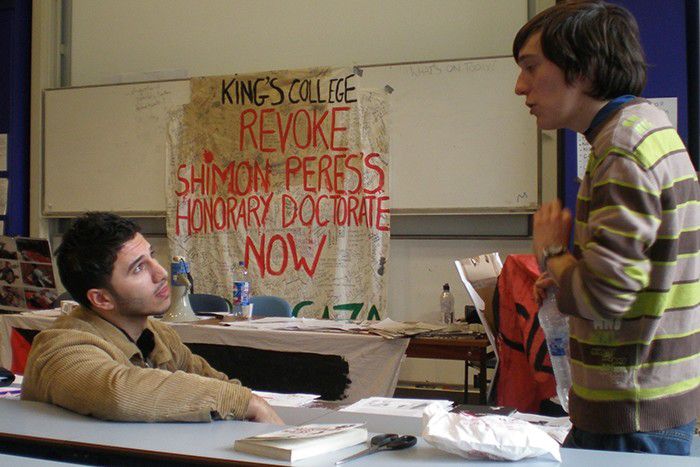
Middle-East: British students still mobilised
Published on
Translation by:
Hayley WoodFighting in the Gaza Strip may be over, but sit-in demonstrations organised via email and Facebook continue in 21 UK universities. Amongst other things, students demand bursaries for Palestinian students. This is a campaign which 'has only just begun'
In the middle of the weekend the classrooms are quiet at King’s College, one of London’s most prestigious universities. However, 25 students still refuse to budge from their seats in a lecture theatre which has become the headquarters of those supporting the Palestinian cause. King’s is the fourth of 21 British universities to be occupied in protest against the Israeli military action which took place in the Gaza Strip in January 2009.
A handful of anti-militarist students were the first to install themselves on 13 January, in a corridor of the School of Oriental and African Studies (SOAS). Similar demonstrations followed at the London School of Economics (LSE), then at Sussex University, Oxford and Cambridge. In less than two weeks, 'occupation committees' sprung up in fifteen other universities. Students demanded a condemnation of Israel’s actions, bursaries for students from Gaza and the boycotting of Israeli products on campus. At King’s College, the major issue at stake was the overturning of the honorary doctorate given by the university to the Israeli president Shimon Peres on 18 November 18 2008.
Honourable Doctor Mugabe
31 January: three ambassadors of the 'occupation committee' are negotiating with Rick Trainer, principal of the university and president of the universities United Kingdom (UUK). The negotiators soon declare victory. As at SOAS, LSE and Sussex, the administration has given its agreement in principle to student bursaries, fund-raising and the sending of supplies to Palestinian universities. The militants’ triumph is however reserved, as the principal has given no sign of revoking the honorary doctorate. He has agreed only to mention the controversy in an official statement.
Talha Abdulrazaq, 21 and in his first year of war studies, is leading the group. 'The occupation is over, but the campaign has only just begun. Remember that they only overturned Mugabe’s doctorate after two years of lobbying!' In July 2007, Edinburgh university divested the Zimbabwean president, Robert Mugabe, of the honorary doctorate given to him 23 years earlier. Elsewhere in the country the issues being negotiated are similar, with occupations of university buildings lasting no longer than two weeks. Students organise follow-up committees and workshops designed to bring consequent promises to fruition.
Universities are publishing joint statements on the internet, taking up the words of the declaration made by Professor Rick Trainer in the name of UK universities: 'UUK supports calls for an end to the fighting in Gaza and beyond. We are particularly aware of the number of civilian casualties which took place in the heart of educational establishments.'
Whatever
British students are rejoicing in particular at the guarantees given by their universities for the allocation of bursaries. 'Imagine, we’ve secured five student bursaries, that’s five families’ lives which are going to change over there!' says Talha with enthusiasm. For Ibrahim Adwan, a 28-year-old from Gaza who was once himself the beneficiary of a student bursary and is now a journalist in London, the gesture is symbolic. In his opinion, hand-outs are little help in a time of conflict. 'Student bursaries are all well and good, but there are already some in place, and what use will new money be if students can’t even get out of Gaza?'
'These demands are not revolutionary'
'These are slender victories,' admits Simon Englert, 19, an active participant in the occupation at Sussex University. However, like his peers, he compares the burgeoning campaign to the anti-apartheid movement of the sixties. Not so for Rodney Barker, professor and head of political sciences at LSE. He observed the occupation of his campus with interest but believes we must put things in perspective, seeing little in recent events in common with the activism of forty years ago. 'These demands are not revolutionary. They are a civil way of demonstrating in an attempt to influence politics, whilst all the while respecting the existing system. Back then it wasn’t a case of polite demonstration, it was rebellion.'
The student demonstrations are mobilising few people
The student demonstrations are mobilising few people: only a hundred or so people on each campus and thus a tiny proportion of the UK’s 2.5 million students. But the militants are hopeful that their ranks will grow, and are using the internet as their main platform. Each occupation adds further fuel to online blogs, and messages of sympathy can already be read from figures like Noam Chomsky and Ken Loach.
Translated from Proche-Orient : des étudiants britanniques toujours mobilisés



